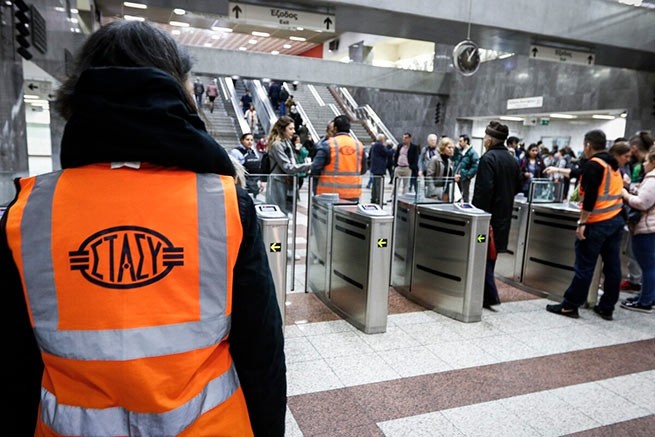Only 1.6% of the population lives in social housing complexes in the Athens metropolitan area, an extremely low percentage compared to other metropolitan areas in the European Union.
After two decades of inactivity, Greece reopens social housing debate. Following the municipalities of the Archdiocese of Thessaloniki, which presented a joint plan a few months ago, and the recent legislative initiatives of the Ministry of Labour, the municipality of Athens presented its own proposal yesterday. In essence, this is a mechanism for subsidized housing, which will operate in the standard of the program “Εστία” (house, housing, shelters) and with the first block of houses already included in it.
The proposal was submitted by the mayor Kostas Bakoyannis the Minister of Labor Kostis Hatzidakis. According to the information, the main points of the proposal are as follows:
- The program will be administered by EATA SA, the legal entity of the Municipality of Athens, which currently runs the housing program for asylum seekers (“Εστία”). As part of the EATA SA program managed to date about 400 apartments, offering 8,000 beds.
- The structure of the program will be similar to the program “Home”. That is, criteria for potential beneficiaries will be established.
- The program will have four target groups:
- Unemployed youth (30% of places),
- young low-income families (30%),
- low-income seniors (25%)
- students who cannot be accommodated in dormitories (15% of places).
Criteria include four main categories: individuals or families (hereinafter referred to as households) associated with housing status, income pattern, unemployment and specific characteristics of beneficiaries.
In terms of housing status, these can be:
- households that are being evicted or are at high risk of being evicted,
- households that live in “informal” housing (e.g. illegally occupied, sublet),
- households in temporary housing as needed,
- households living in unfavorable conditions (e.g. in a basement, no heating, moisture, external sanitary facilities, leaks, etc.) or persons who are in an unsafe condition in the family home.
Income level:
- must be recipients of a guaranteed minimum income,
- or long-term unemployed
- or members of special OAED social groups.
Social criteria may also be established, such as:
- young people in the process of deinstitutionalization,
- broken families,
- highly disabled people,
- recently released from prison
- drug addicts,
- gypsies,
- victims of human trafficking,
- LGBT+,
- beneficiaries of international protection programs, etc.
Characteristically, the number of homeless people supported by various structures of the municipality of Athens is currently estimated at 4,000 people.
Program beneficiaries will receive supportive services in addition to housing, which can range from job search assistance (tentatively for the unemployed) to support in the proper functioning of the home.
According to the proposal of the Municipality of Athens, the program can be funded from two sources: from the Operational Program “Human Resources and Social Cohesion 2021-2027” and from the Attica Regional Development Plan as part of an action for the homeless or those in need of help at risk of becoming homeless.
The municipality now has the experience of the Estia program. “In other words, a culture of benefit has developed among homeowners,” explains Alexandros Tsiatziamis, general secretary of the municipality. “Given that the number of asylum seekers is currently declining, some of this stock may be available immediately. This model, financed from European sources, is a solution for “immediate intervention” in the existing one.”
As for the benefits of the program, they will be clarified in the next period depending on the type of grant. According to Mr. Tsiatsiamis, “the program will cover all or most of the rent for up to 5 years. Its goal, of course, will be to create conditions for the beneficiaries to get on their feet and quickly gain financial autonomy. Perhaps homeowners in poor condition could be given a subsidy for their repairs, with a commitment to join the program within a few years.”
Lack of housing policy
Only 1.6% of the population, according to the Municipality of Athens, lives in social housing complexes in the Athens metropolitan area. The percentage is extremely low compared to other EU metropolitan areas (approximately: Brussels 7.4%, Stockholm 15.2%, Helsinki 19%). These are the people who live in 19,299 houses built from the interwar period until 2004 by three bodies (Ministry of Social Welfare, Workers’ Housing Organization and DEPOS) in the Athens metropolitan area.
We are talking about the construction of houses for vulnerable segments of the population. With regard to social renting, Greece is the only European country where this sector completely missing due to lack of housing policy. In Greece, there are only housing assistance programs, ie. rental subsidy for households with special characteristics (e.g. homeless, uninsured seniors). However, the housing problem no longer concerns only vulnerable social groups: despite the very high percentage of homeownership in our country (it reaches 75%), housing insecurity remains very high. According to research EU SILC 2020, 32.6% of households and 82.5% of poor households spend more than 40% of their income on housing costs.






More Stories
Low wages and inflation "drown" Greek youth
Greece becomes a 'safe haven' for German pensioners
Bark Air: New airline specializing in pet transportation launches in May